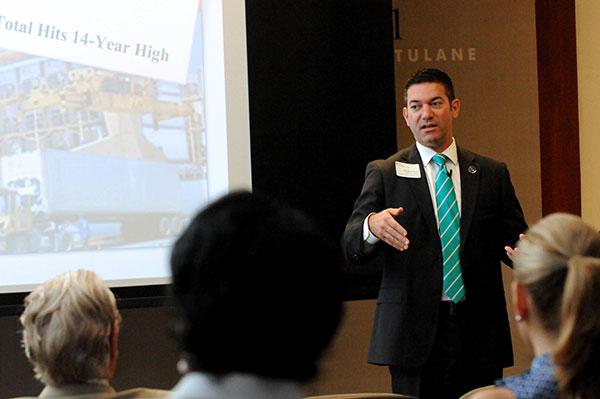The next economic hurdle? Achieving critical mass
In the 10 years since Hurricane Katrina, New Orleans has staged a remarkable economic comeback, adding thousands of jobs, attracting billions of dollars in investment and topping a host of “best-of” lists — everything from top cities for export growth to cities with the biggest increase in number of college graduates.

But in a talk at Tulane University’s A. B. Freeman School of Business on Wednesday (Aug. 19), the head of the nonprofit charged with leading the region’s economic development efforts said the hard part is just starting.
“I think our challenge over the next 10 years is building critical mass,” said Michael Hecht, president and CEO of GNO Inc. “[Harvard Business School professor] Rosabeth Moss Kanter said change is easy at first, but it gets hard in the middle. Here’s the thing: We’re getting to the middle.”
Hecht was the featured speaker at Katrina+10: New Orleans Now, a discussion of the city’s business environment 10 years after Katrina. Sponsored by the Freeman School and the Tulane Association of Business Alumni (TABA), the program also featured Gary LaGrange, president and CEO of the Port of New Orleans, as well as remarks from Freeman School Dean Ira Solomon and TABA President Chris Bonura.
Hecht said New Orleans is currently caught in what amounts to a chicken-and-egg situation: Some workers are reluctant to move here because of the limited number of employers and some employers are reluctant to move here because of the limited numbers of workers.
To reach the so-called tipping point — the point at which economic development becomes self-sustaining — Hecht said the region will need more companies, more employees, more venture capital to support growth and a regional brand that goes beyond food, music and Mardi Gras.
“That’s going to be hard work,” Hecht said. “But if we can get to that point and become self-sustaining, then economic development is going to become much more organic. We’re not there yet, but I’m incredibly optimistic about our chances.”
LaGrange followed Hecht with a discussion of the port’s accomplishments of the last 10 years as well as goals for the future. While port cargo is at a 14-year high, LaGrange said significant infrastructure investments will have to be made to continue to attract new companies.
“It’s all about financing for infrastructure improvements," LaGrange said. “In order to maintain our competitive advantage, we’re going to have to find additional sources of financing.”
Bonura said Katrina+10 was the first of what he hopes will be many programs designed to bring alumni back into the classroom for educational events centered on important business topics. The presentation was broadcast over the web to alumni around the country.
Interested in advancing your education and/or career? Learn more about Freeman’s wide range of graduate and undergraduate programs. Find the right program for you.
Recommended Reading
- Stewart Center hosts first MBA Experience Weekend
- How to Choose an MBA Concentration
- What Will You Learn in an MBA Curriculum?
- Part-Time vs. Full-Time MBA
- Alum leverages MFIN degree to launch investment banking career
- Freeman Graduation Gift Guide
- What Is a STEM-Designated Degree Program?
- Types of MBA Degrees
Other Related Articles
- Alum celebrates Pride at Entergy and beyond
- Executive MBAs travel to South Africa for lessons in global management
- Alum takes center stage at Kentucky Derby
- Alum balances finance and foxtrots
- Freeman rises in latest U.S. News MBA ranking
- Alum pioneers AI solutions at Entergy
- Candy Man: Alum helps spread the love on Valentine’s Day
- Bernick shares lessons on leadership and culture as 2025 Freeman Lecturer
